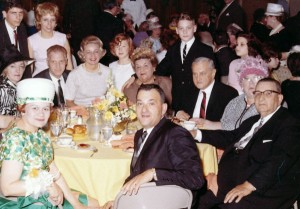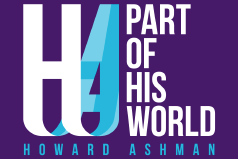Bar Mitzvah - 1963
 Getting ready for Howard’s Bar Mitzvah took all morning. Four people with nerves directly tuned to their bowels sharing one bathroom -- wild eyed and demanding – my turn next. Howard was tense and solemn. He’d bitten his fingernails down to stubs and a few were still bloody around the cuticles where the dead skin had been painfully and deliberately tugged off. All week, he had been indulging another life-long habit -- tearing corners off of paper and rolling them up into little balls then chewing them with his front teeth, like a blond rabbit.
Getting ready for Howard’s Bar Mitzvah took all morning. Four people with nerves directly tuned to their bowels sharing one bathroom -- wild eyed and demanding – my turn next. Howard was tense and solemn. He’d bitten his fingernails down to stubs and a few were still bloody around the cuticles where the dead skin had been painfully and deliberately tugged off. All week, he had been indulging another life-long habit -- tearing corners off of paper and rolling them up into little balls then chewing them with his front teeth, like a blond rabbit.
We arrived at the Temple early. It was a modern wonder, as different from its downtown predecessor as Bauhaus is from Chippendale. The new Temple was on Park Heights Avenue – the Holy Highway, we snidely called it. Every few blocks, a freshly built synagogue sat framed by large lawns and new trees, each designed by a modern architect, molding light and space.
No one ever approached our synagogue from the carefully designed front entrance. This was a place of worship for modern American Jews, who had suspended the law about not traveling on the Sabbath, in favor of better homes in nicer neighborhoods that were not walking distance to temple.
Howard, Mom, Dad and I entered through the parking lot, walking through the prosaic Sunday School building to the sanctuary. Our footsteps echoed on the gray terrazzo floor of the glass hallway that connected the Sunday School to the Sanctuary. Howard’s face was grim and focused while Mom talked nervously about pricey caterers and inconsiderate relatives who had cancelled at the last minute.
We met the photographer, who’d been hired by my grandparents to put together a nice album, and like movie stars, began to pose.
It was May of 1963 and Mom’s Kelly green silk suit, with a long jacket and a slim skirt worked perfectly with her hair, which was Lucille Ball red and had been cut and teased into a bubble. She’d crowned her hair with a large white Mad Hatter hat, custom made and sporting a band that matched her blouse.
At 10, I was kept in the frilly short white socks I detested. My little-girl posture popped my belly out of the peach crinolined dress. The tailored bows pinning my sprayed hair to the side of my head made me look like Sally on the Dick Van Dyke Show. I had been to the same hairdresser as my mother and though he’d made my mom a striking redhead, he’d managed to make me look like an elementary-school old maid.
Dad was in a dark suit with a thin tie chosen by my mother. Though Dad loved fashion and grew up envying the zoot-suited hipsters of his neighborhood, he was color blind and helpless before Mom’s fashion sense.
Howard’s blond curls were slicked back and then pushed forward into a tsunami wave of hair, adding yet more softness to his face, still round with baby fat. His voice had not yet changed and neither had he. He may declare himself a man on this day but he was still a few years away. His boyish softness was feminine but no more feminine than most boys of thirteen. He was not fey, but he was fair and scrubbed.
Cantor Grobani and Rabbi Shaw, already in their robes, greeted us. They shook hands with Howard and Dad, kissed Mom on the cheek and patted me on the head. A kind gesture I barely felt due to the hairspray on my helmeted hair.
Howard went into the Rabbi’s study with them and whatever was said there, he looked calmer when he came out a few minutes later and joined us in the sanctuary. It was brightly lit -- like a theater with the work lights on. I felt as if I’d just discovered that the mighty Oz is the old man behind the curtain. The eternal light, as promised, glowed eternally above us, but in the morning sun, the arm from which it hangs is clearly a gas line – even miracles sometimes need help.
Howard and Mom and Dad followed the Rabbi and Cantor to wait behind the wall for their entrance, emerging eventually like the chorus in a solemn but grand opera.
Befittingly, Howard read his Haftorah with theatrical intensity. Cantor Grobani looked on in approval, but then no Cantor really looks on disapprovingly at a Bar Mitzvah. Howard gave his speech, in which he thanked his parents and half of Baltimore for their love and support. Dad had borrowed a large tape recorder to record Howard’s speech for what we believed was posterity but wound up being only for a couple of years since the tape was soon lost, a victim of either a move or an overzealous housecleaning.
The invited guests filed out for a cocktail hour without cocktails in the Jacob and Henrietta Blaustein auditorium, just opposite the sanctuary. We stayed behind for photographs with the Rabbi and Cantor. Variations of us, smiling broadly, stood in front of the ark. Howard posed with the Cantor, shaking hands while looking at the camera, not each other.
The caterers were anxious to serve lunch and I was anxious to eat. In our hurry, and perhaps for the first time in our family life, we had neglected to eat breakfast.
Family and friends sat at round tables draped in green and gold cloth. For once, the kid’s table was at the front of the room, in pride of place instead of in the kitchen. Howard sat there, preening and popping up to talk to friends or take envelopes slipped to him by smiling relatives.
Our grandmother (n the pink hat), known universally as Nana, wanted Howard to sing. “Everyone is asking,” she insisted. This was doubtful and besides, Howard was adamant in his refusal. He had grown since the days of willingly singing whenever Nana asked, and was more wary of audiences and more aware of propriety. Even Mom and Dad knew that his Bar Mitzvah luncheon wasn’t the time for another performance.
“Mother,” warned our own mother.
“He already sang for his supper once today,” said Dad. “He gave a damn great speech and read like a Rabbi. Give the boy the rest of the day off.”
Nothing more was mentioned of singing.
Howard’s cake was in the shape of an open book. On one side was Howard’s name and the date, May 18, 1963. On the other side, created in dark blue icing, were the Greek masks of comedy and tragedy, a tribute to the stage-struck Bar Mitzvah boy.
There would be yet another cake at the kid’s party at the house that evening. One of Nana’s famous German chocolate cakes. By family tradition and in deference to my dislike of coconut, she slathered the cake with chocolate butter cream icing instead of the traditional coconut and brown sugar.
My parents assured Howard that this party would be kids only and that they would remain upstairs, coming downstairs only to make sure everyone had enough to eat and drink. By eight the basement rec room was full of kids. Howard’s two groups of friends eyed each other from across an invisible divide in the middle of the black and cream tiled floor. The neighborhood kids and school friends lounged together, waiting for the music to start, eager to dance. Howard’s CTA friends were slightly older and more sophisticated, and in their own adolescent way, aloof. But they too, just wanted the music to start.
A few kids, like junior delegates to UNICEF bridged the gap and began to make introductions. Howard nervously turned on the record player. The Ronnettes start singing:
Be my, be my, be my little baby
Say you’ll be my daarlin’
Be my baby now-o-wow
Whoa oh oh oh ohhh
Kids started to sway. The evening would be a success.
